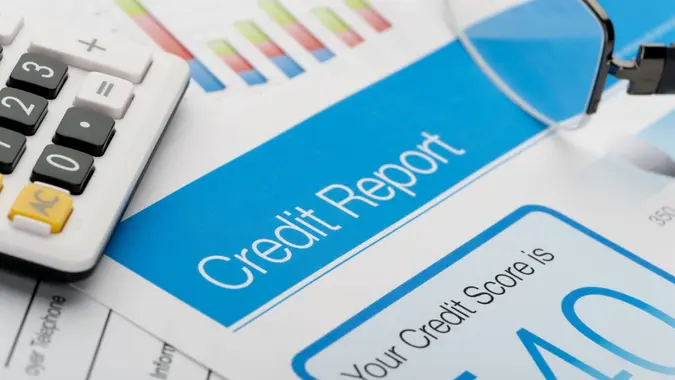What Is a Credit Privacy Number (CPN)? Everything You Need To Know

Commitment to Our Readers
GOBankingRates' editorial team is committed to bringing you unbiased reviews and information. We use data-driven methodologies to evaluate financial products and services - our reviews and ratings are not influenced by advertisers. You can read more about our editorial guidelines and our products and services review methodology.

20 Years
Helping You Live Richer

Reviewed
by Experts

Trusted by
Millions of Readers
A CPN, or Credit Privacy Number, is a nine-digit number some companies market as a substitute for your Social Security number. You might also hear it called a “credit profile number” or “credit protection number.”
CPNs are often pitched as a way to protect your identity or rebuild credit, especially if your credit history is less than ideal. But here’s the truth: CPNs aren’t issued by any government agency or credit bureau — and in many cases, they’re either randomly generated or stolen Social Security numbers, often belonging to children or the elderly.
How Does a CPN Work?
Scammers who sell CPNs often tell buyers to use the number instead of their SSN on credit applications. They might also suggest applying for an Individual Taxpayer Identification Number (ITIN) through the IRS to pair with the CPN, creating the illusion of a fresh identity.
Some credit repair companies will even coach clients to use fake addresses or names to reinforce the lie. While this may sound like a quick fix, it’s fraud — and the consequences can be steep.
Does Using a CPN Affect Your Credit Score?
CPNs don’t link to your legitimate credit profile, which means they won’t help your score in any meaningful way. Using a CPN can backfire in a big way:
- Lenders may flag your application as suspicious
- Credit bureaus might issue fraud alerts on your report
- You could be denied loans or credit cards due to inconsistencies or unverifiable information
Rather than boosting your credit, CPNs are more likely to damage your financial standing — or worse, trigger a legal investigation.
Risks of Using a CPN
- Most CPNs aren’t unique — many are recycled or flat-out stolen Social Security numbers.
- Using a CPN to apply for credit is considered identity theft, even if you didn’t know the number was stolen.
- If caught, you could face hefty fines, criminal charges or even prison time.
It’s also worth noting that the statute of limitations for identity theft varies by state, with some having no expiration. That means using a CPN once could haunt you for years.
Should You Get a CPN?
There’s no legal way to get a CPN. Any company claiming otherwise is either misinformed or intentionally misleading.
Searching “how to get CPN” online turns up dozens of shady services that promise a fresh start for a fee. These companies might use buzzwords like “credit repair identity” or “legal credit reset.”
If someone offers you a CPN, run the other way.
How To Avoid CPN and Credit Repair Scams
If you’re considering working with a credit repair agency, look out for these red flags:
- They demand payment upfront: Legitimate agencies may charge modest fees, but never before providing services.
- They threaten you with legal consequences or pressure you to act quickly: Scare tactics are a big red flag.
- They won’t explain your consumer rights: A trustworthy company will always be transparent.
- They encourage you to lie: Whether it’s disputing accurate information or using false data, that’s a serious warning sign.
Instead, look for agencies certified by the National Foundation for Credit Counseling (NFCC) or the Financial Counseling Association of America (FCAA).
How To Rebuild Credit Without Using a CPN
Here are some real, legal ways to improve your credit score:
1. Pay Your Bills on Time
Your payment history makes up 35% of your credit score. Even one late payment can hurt your score, so set reminders or automate payments if needed.
2. Use a Secured Credit Card
A secured credit card requires a cash deposit upfront and reports your payments to the credit bureaus. It’s a great way to establish or rebuild credit.
3. Consider a Credit-Builder Loan
With a credit-builder loan, you pay into a savings account, and your payments are reported to the credit bureaus. Once the loan is paid off, you get access to the money — and a better score.
4. Become an Authorized User
Ask a trusted friend or family member to add you to their existing credit card as an authorized user. Their good habits can reflect positively on your credit file.
5. Monitor Your Credit Reports
Regularly check your credit reports from Experian, Equifax and TransUnion. You can get a free report annually from AnnualCreditReport.com. If you see errors, dispute them right away.
6. Try Experian Boost
Experian Boost allows you to add recurring payments like utilities or streaming services to your credit file. According to Experian, the average user sees a 13-point increase to their FICO score.
Final Take to GO
A CPN is a risky, illegal workaround that won’t help your credit and could seriously hurt your future. While rebuilding credit takes time, there are safe, proven methods to get back on track. Start with one step at a time, be consistent, and stay informed.
For more help on building or repairing your credit, check out:
- How to Build Credit From Scratch
- Best Credit Cards for Rebuilding Credit
- Signs You’re Serious About Raising Your Credit Score
FAQ About CPNs
Here are some common questions that might pop up while looking into what is a credit privacy number:- What is a CPN, and is it legal?
- A CPN is a nine-digit number some people use in place of an SSN on credit applications. Using a CPN is illegal and often constitutes fraud or identity theft.
- Can I use a CPN instead of my SSN?
- No. Any credit or loan application that asks for your SSN expects your real, government-issued number. Substituting it with a CPN is considered deception.
- Are CPNs the same as EINs?
- No. An Employer Identification Number (EIN) is issued by the IRS for business tax purposes. A CPN is not issued by any legitimate government agency.
- What happens if I use a CPN?
- If caught, you could face legal penalties, damaged credit and possibly jail time -- even if you didn’t know the number was stolen.
- What’s the safest way to rebuild my credit?
- Stick to tried-and-true methods: pay your bills on time, lower your debt, use secured credit tools and monitor your credit reports. Avoid shortcuts -- they often come with steep consequences.
Chris Ozarowski contributed to the reporting for this article.
Editorial Note: This content is not provided by any entity covered in this article. Any opinions, analyses, reviews, ratings or recommendations expressed in this article are those of the author alone and have not been reviewed, approved or otherwise endorsed by any entity named in this article.
Our in-house research team and on-site financial experts work together to create content that’s accurate, impartial, and up to date. We fact-check every single statistic, quote and fact using trusted primary resources to make sure the information we provide is correct. You can learn more about GOBankingRates’ processes and standards in our editorial policy.
- IRS "Individual taxpayer identification number (ITIN)"
- CFPB "Fraud and scams"
- AnnualCreditReport.com "website"
 Written by
Written by  Edited by
Edited by 























